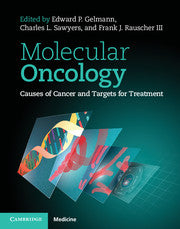Molecular Oncology : Causes of Cancer and Targets for Treatment
- Unit price
- / per
-
Author:GELMAN Edward / SAWYERS Charles / RAUSCHER
-
ISBN:9780521876629
-
Publication Date:December 2013
-
Edition:1
-
Pages:979
-
Binding:Hardback
-
Publisher:Cambridge University Press
-
Country of Publication:United Kingdom


A Back Order button means that we don’t have the book in stock at our store. It may already be on order – or we can order it for you from a publisher or distributor at no additional cost.
As we source items from around the globe, a back-order can take anywhere from 5 days to several weeks to arrive, depending on the title.
To check how long this might take, you’re welcome to contact us and we can provide an ETA or any other information you need. We recommend checking the timeframe before committing to an online order.
Molecular Oncology : Causes of Cancer and Targets for Treatment
- Unit price
- / per
-
Author:GELMAN Edward / SAWYERS Charles / RAUSCHER
-
ISBN:9780521876629
-
Publication Date:December 2013
-
Edition:1
-
Pages:979
-
Binding:Hardback
-
Publisher:Cambridge University Press
-
Country of Publication:United Kingdom
Description
The genomic era has allowed enormous strides in our understanding of the molecular changes that underlie malignant transformation. Mutations have been discovered that are critical drivers of large cross-sections of human cancers. These discoveries have allowed us to find drugs that target these drivers and make important strides in treatment. Genomics and high-throughput technologies have illuminated the complexity of cancer and the facility with which cancers adapt during their natural history. The field is evolving rapidly with new discoveries and new drugs reported monthly. This book is a timely foundation for understanding in context the origins of molecular oncology and its future directions. The content reviews available technologies for the analysis of cancer tissues and genes; summaries of key oncogenic pathways from a molecular perspective; the technologies, pathways and targeted therapies of a wide range of human malignancies; and new pharmacologic therapies that have a common mechanistic target.
Adding product to your cart
You may also like
A Back Order button means that we don’t have the book in stock at our store. It may already be on order – or we can order it for you from a publisher or distributor at no additional cost.
As we source items from around the globe, a back-order can take anywhere from 5 days to several weeks to arrive, depending on the title.
To check how long this might take, you’re welcome to contact us and we can provide an ETA or any other information you need. We recommend checking the timeframe before committing to an online order.
You may also like
You may also like
-
The genomic era has allowed enormous strides in our understanding of the molecular changes that underlie malignant transformation. Mutations have been discovered that are critical drivers of large cross-sections of human cancers. These discoveries have allowed us to find drugs that target these drivers and make important strides in treatment. Genomics and high-throughput technologies have illuminated the complexity of cancer and the facility with which cancers adapt during their natural history. The field is evolving rapidly with new discoveries and new drugs reported monthly. This book is a timely foundation for understanding in context the origins of molecular oncology and its future directions. The content reviews available technologies for the analysis of cancer tissues and genes; summaries of key oncogenic pathways from a molecular perspective; the technologies, pathways and targeted therapies of a wide range of human malignancies; and new pharmacologic therapies that have a common mechanistic target.
-
-
Author: GELMAN Edward / SAWYERS Charles / RAUSCHERISBN: 9780521876629Publication Date: December 2013Edition: 1Pages: 979Binding: HardbackPublisher: Cambridge University PressCountry of Publication: United Kingdom
The genomic era has allowed enormous strides in our understanding of the molecular changes that underlie malignant transformation. Mutations have been discovered that are critical drivers of large cross-sections of human cancers. These discoveries have allowed us to find drugs that target these drivers and make important strides in treatment. Genomics and high-throughput technologies have illuminated the complexity of cancer and the facility with which cancers adapt during their natural history. The field is evolving rapidly with new discoveries and new drugs reported monthly. This book is a timely foundation for understanding in context the origins of molecular oncology and its future directions. The content reviews available technologies for the analysis of cancer tissues and genes; summaries of key oncogenic pathways from a molecular perspective; the technologies, pathways and targeted therapies of a wide range of human malignancies; and new pharmacologic therapies that have a common mechanistic target.
-
Author: GELMAN Edward / SAWYERS Charles / RAUSCHERISBN: 9780521876629Publication Date: December 2013Edition: 1Pages: 979Binding: HardbackPublisher: Cambridge University PressCountry of Publication: United Kingdom
-




